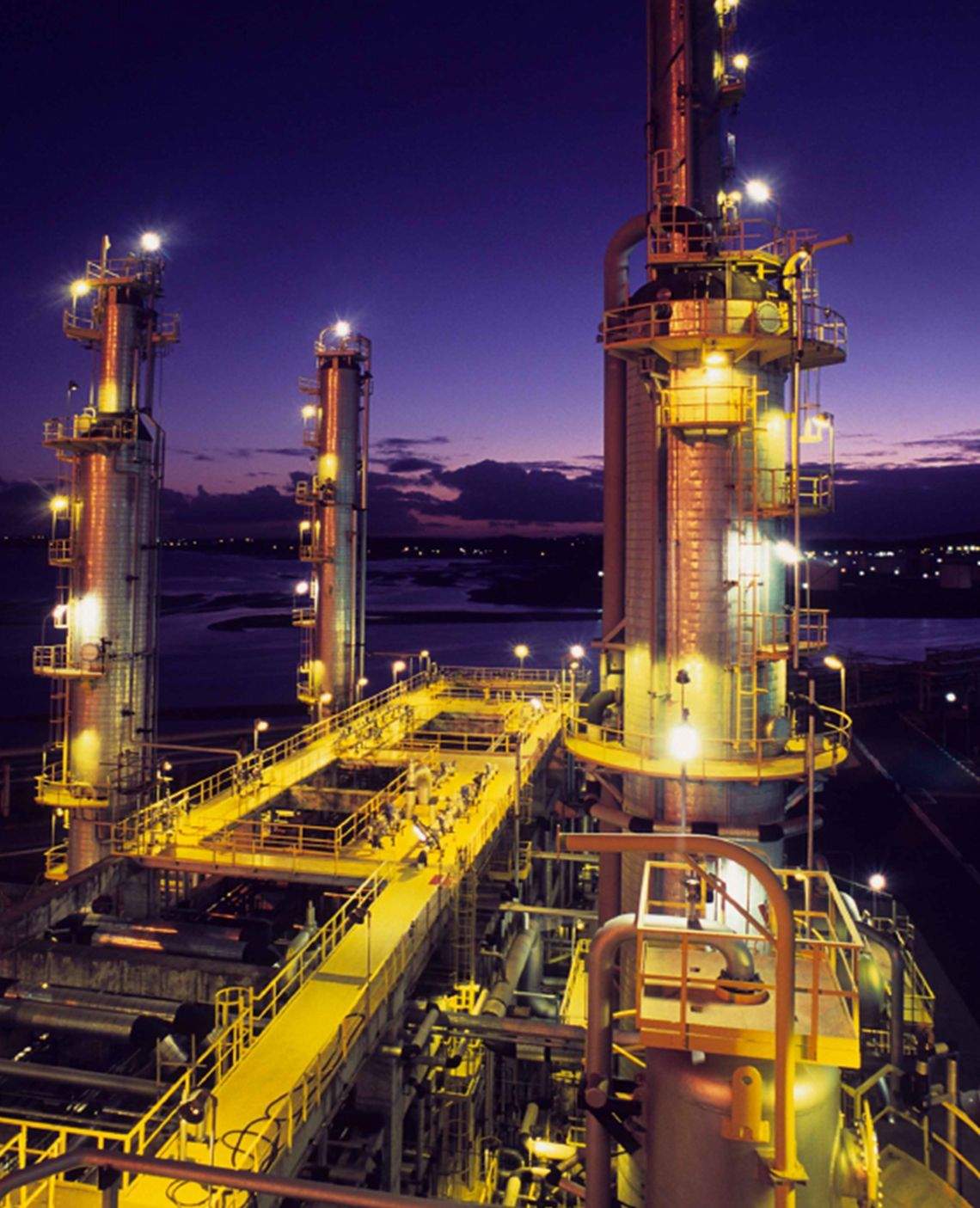
Technologies
Oil refinery is an industrial enterprise whose main function is oil refining.
The production cycle of a refinery usually consists of the preparation of raw materials, primary distillation of oil and secondary processing of petroleum fractions: catalytic cracking, catalytic reforming, coking, visbreaking, hydrocracking,
hydrotreating and mixing components of finished oil products.
First, the oil is dehydrated and desalted in special plants for the separation of salts and other impurities that cause corrosion of equipment, slow down cracking and reduce the quality of products processing.
No more than 3-4 mg / l of salts and about 0.1% water remain in oil.
Then the oil enters the primary distillation.
Primary processing - distillation
Liquid petroleum hydrocarbons have different boiling points. Distillation is based on this property.
When heated in a distillation column to 350 ° C, various fractions are allocated sequentially from the oil with increasing temperature.
Oil at the first refineries is distilled to the following fractions:
- straight run gasoline (it boils in the temperature range 28-180 ° C),
- jet fuel (180-240 ° C),
- diesel fuel (240-350 ° C).
The remainder of the oil distillation is fuel oil.
For distillation of oil, 5 distillation columns are used, in which various oil products are sequentially separated.
The output of gasoline during the initial distillation of oil is insignificant, therefore, its secondary processing is carried out to obtain a larger volume of automobile fuel.
Secondary processing - Cracking
The secondary oil processing is carried out by thermal or chemical catalytic decomposition of the products of primary oil distillation to obtain more gasoline fractions, as well as raw materials for the subsequent production of aromatic hydrocarbons - benzene, toluene and others. One of the most widespread technologies of this cycle is cracking (English cracking - splitting).
The yield of light components in the cracking process, from which it is then possible to prepare gasoline, kerosene, diesel fuel, ranges from 40-45 to 55-60%. The cracking process allows the production of components for the production of lubricating oils from fuel oil. Catalytic cracking was discovered in the 1930s. The catalyst selects from the feedstock and sorbes on itself, first of all, those molecules that are capable of dehydrogenating quite easily (giving off hydrogen). The unsaturated hydrocarbons formed in this process, having increased adsorption capacity, enter into contact with the active sites of the catalyst. The polymerization of hydrocarbons, resins and coke.
The released hydrogen takes an active part in hydrocracking, isomerization, and other reactions.
The cracking product is enriched in light, high-quality hydrocarbons and as a result, a wide gasoline fraction and diesel fuel fractions are obtained, which are related to light petroleum products.
The result is hydrocarbon gases (20%), gasoline fraction (50%), diesel fraction (20%), heavy gas oil and coke.
Hydrotreating
Hydrotreating is carried out on hydrogenation catalysts using aluminum, cobalt and molybdenum compounds. One of the most important processes in oil refining.
The raw material is mixed with a hydrogen-containing gas with a concentration of 85-95% vol. Coming from circulation compressors that maintain pressure in the system.
The resulting mixture is heated in an oven to 280-340 ° C, depending on the feedstock, and then enters the reactor. The reaction proceeds on catalysts containing nickel, cobalt or molybdenum under pressure up to 50 atm. Under such conditions, the destruction of sulfur and nitrogen-containing compounds with the formation of hydrogen sulfide and ammonia, as well as the saturation of olefins. In the process, due to thermal decomposition, an insignificant (1.5–2%) amount of low-octane gasoline is formed, and 6–8% of the diesel fraction is also formed during hydrotreating of vacuum gas oil. In the purified diesel fraction, the sulfur content may decrease from 1.0% to 0.005% or lower. Process gases are cleaned to recover hydrogen sulfide, which is supplied to the production of elemental sulfur or sulfuric acid.
Finished products preparation
Gasoline, kerosene, diesel fuel and technical oils are divided into different grades depending on the chemical composition.
The final stage of refinery production is the mixing of the obtained components to obtain finished products of the required composition.
This process is also called compounding or blending.



